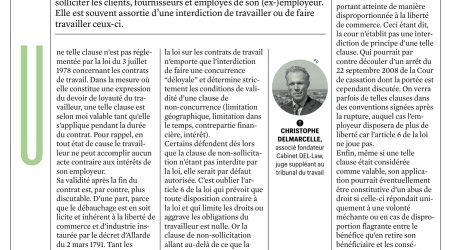Can a recording of a Teams video conference be presented in court? (Trends - 14-09-2023)
Posted the 24 October 2023In the context of a dispute with his employer, an employee submits a recording of a meeting held on Teams with his HR director, notably without the knowledge of other participants. Can the judge take this into account?
Naturally, the employer opposes the submission of this recording, which is highly unfavorable to him, arguing, among other things, the violation of telecommunications secrecy, privacy, and additionally, that it cannot be guaranteed that the recording had not been tampered with.
The Labor Court of Brabant Wallon, in 2023, found the recording admissible after a detailed analysis of the Teams' terms of use and the meeting's organizational modalities.
The court first notes that the possibility of recording the conversation is expressly mentioned in the program's description by its developer, Microsoft, which also specifically indicates the recording modalities, particularly the fact that all participants are automatically informed at the start of a recording.
It follows that the employer cannot claim not to have been warned or to have been surprised by this recording.
Continuing its analysis, the court also finds that a participant can only use the recording option if certain conditions are met, especially if he is an administrator of the meeting, if the capability is allowed by the company's IT administrator, and does not come from another company.
And the court validates that these conditions were indeed met by the worker who was one of the meeting's administrators, without restrictions, and who was still part of the company.
Finally, the court observes that in Teams, "contextual windows" informed all participants of the meeting's recording.
The court believes that the recording does not violate the privacy of the HR director (and other participants) as he could not reasonably believe the conversation was private given that, as indicated, he knew or should have known that recording was possible and ongoing, that the conversation was strictly professional, and had been organized by the employer during working hours.
The use of this recording feature by the worker to defend his rights is not unfair.
The court further recalls that in its ruling of October 14, 2021, the Court of Cassation confirmed that its "Antigone" jurisprudence, which allows - under certain conditions - a judge to accept evidence obtained in violation of privacy, applies in civil matters (subject of debate for years) and that therefore, even if the recording had been null and void, it could still have been deemed admissible.
Forewarned is forearmed for employers…
Related articles

Caution if a former colleague opposed to your employer asks you to testify in their favor

Social TV Show #1 | The Flexibility of Remuneration and Salary Transparency
